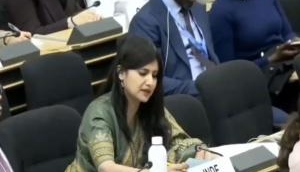
About 800,000 Rohingyas are now living in refugee settlements in Bangladesh, and 589,000 of them are in the country's Cox's Bazar since they began to flee from Myanmar on August 25.
According to separate reports filed by the Daily Star and the Dhaka Tribune, a majority of these refugees are being exposed to desperate living conditions and waterborne diseases.
Both papers quoted Unicef Executive Director Anthony Lake, as saying in a statement on Friday that adults and children urgently need food, safe water, sanitation and vaccination to protect themselves from diseases that thrive in emergencies.
On children, he said, "They need education, counselling and hope."
Edouard Beigbeder, Unicef representative in Bangladesh, was quoted by the Daily Star, as saying, "The refugees are still coming, but already we can see the appalling dangers that the children are facing. Living in the open, with food, safe water and sanitation in desperately short supply, the risk of waterborne and other diseases is palpable."
The International Organisation for Migration (IOM) has, according to the Daily Star estimated that more than half of the new arrivals are women and girls.
It also identified a total of 28 collective sites and 99 locations in host communities where the refugees were staying between September 30 and October 9.
Of the Rohingya population, 33,542 (four percent) were registered and living in two UNHCR refugee camps. The remaining 96 percent were living in makeshift settlements, spontaneous sites and host communities, it added.
Meanwhile, the Dhaka Tribune has reported that even well-off Rohingyas are being forced to flee from Myanmar.
Several makeshift settlements have reportedly come up in Ukhia and Teknaf, the IOM said in a statement.
Attempts to pay off the military to remain in Northern Rakhine state have come to nought, a Bangla Tribune report said.
There are a number of well-off Rohingya families now waiting to cross into Bangladesh. Many of them own vast areas of land, money, small businesses and even factories in Rakhine.
-ANI







![BJP's Kapil Mishra recreates Shankar Mahadevan’s ‘Breathless’ song to highlight Delhi pollution [WATCH] BJP's Kapil Mishra recreates Shankar Mahadevan’s ‘Breathless’ song to highlight Delhi pollution [WATCH]](https://images.catchnews.com/upload/2022/11/03/kapil-mishra_240884_300x172.png)

![Anupam Kher shares pictures of his toned body on 67th birthday [MUST SEE] Anupam Kher shares pictures of his toned body on 67th birthday [MUST SEE]](https://images.catchnews.com/upload/2022/03/07/Anupam_kher_231145_300x172.jpg)






